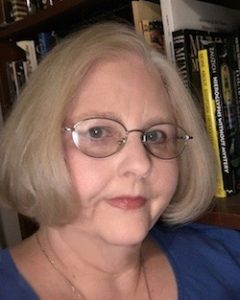Women in Horror Month – Interview with Paula Guran
 February is Women in Horror Month! The HWA is celebrating by posting interviews with award-winning authors and editors. Following is an interview with Paula Guran, who won the Bram Stoker award in 1998 and 1999 for her non-fiction work, “DarkEcho.”
February is Women in Horror Month! The HWA is celebrating by posting interviews with award-winning authors and editors. Following is an interview with Paula Guran, who won the Bram Stoker award in 1998 and 1999 for her non-fiction work, “DarkEcho.”
Tell us a little about your Bram Stoker Award-winning work(s). Inspirations? Influences? Anecdotes about the writing or critical reaction?
PG: It was a very long time ago. At the time it was notable for things that may not seem remarkable now. I was the first person to be given “active” status on professional digital credits alone. The awards were for a weekly email newsletter named “DarkEcho”. It was seen, at the time, as not only informative, but the “nexus” of the horror community.
Talk about winning the award – how surprised were you? Did winning pay off in any interesting ways?
The first time I sort of suspected I might win. The second time, they actually gave Neil Gaiman my award instead of his and he announced it saying, “Oh look this one’s for Paula.” So I had that much warning. But I wasn’t expecting it otherwise and was pretty unprepared. I know I thanked folks, but also asked them not to give the nonfiction award to me again as there were so many outstanding nonfiction books overlooked.
Hard to say how it “paid off” directly. “DarkEcho” certainly helped establish me a professional in the field and the Stokers were some validation of that.
Do you think women in horror face more difficulties than their male peers?
PG: If you are talking about a woman who writes or edits, I think the challenges are about the same now in publishing as they are for a man. There are areas probably easier for a woman to break into; areas men will have an easier time. For women who write for the screen or direct, I think it is still hard to get a foot in the door.
I feel any woman creative who considers herself only “in horror,” though, may have a lot of difficulties of many kinds. I suppose it depends on what you want, but don’t confuse a very small, insular community for the world. If you want only to write for a limited audience and enjoy feeling you are part of a group of like-minded individuals—if that makes you happy, then that is great. But if you want to become a professional writer, then you need to avoid isolating yourself.
What advice would you give to new female authors looking to break into horror?
PG: Don’t look at it as “breaking into horror.” Look at it as breaking into publishing and becoming a well-published author.
What new works from you can we look forward to in the future?
PG: Anthologies edited for the rest of the year:
- March 2017: The Mammoth Book of the Mummy (Prime)
- April 2017: Swords Against Darkness (Prime)
- May 2017: Ex Libris: Stories of Librarians, Libraries, and Lore, ed. Paula Guran(Prime)
- July 2017: The Year’s Best Dark Fantasy & Horror: 2017 Edition (Prime)
- September 2017: Witches Brew: Stories for the Season (Prime)
- Fall (unsure of date) 2017: Fantastic New York (Night Shade)
Paula Guran is senior editor for Prime Books. She edited the Juno fantasy imprint from its small press inception through its incarnation as an imprint of Pocket Books. Guran edits the annual Year’s Best Dark Fantasy and Horror series as well as a growing number of other anthologies. In an earlier life she produced weekly email newsletter DarkEcho (winning two Stokers, an IHG award, and a World Fantasy Award nomination), edited Horror Garage (earning another IHG and a second World Fantasy nomination), and has contributed reviews, interviews, and articles to numerous professional publications.



